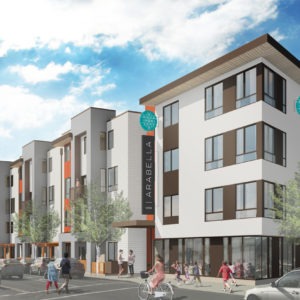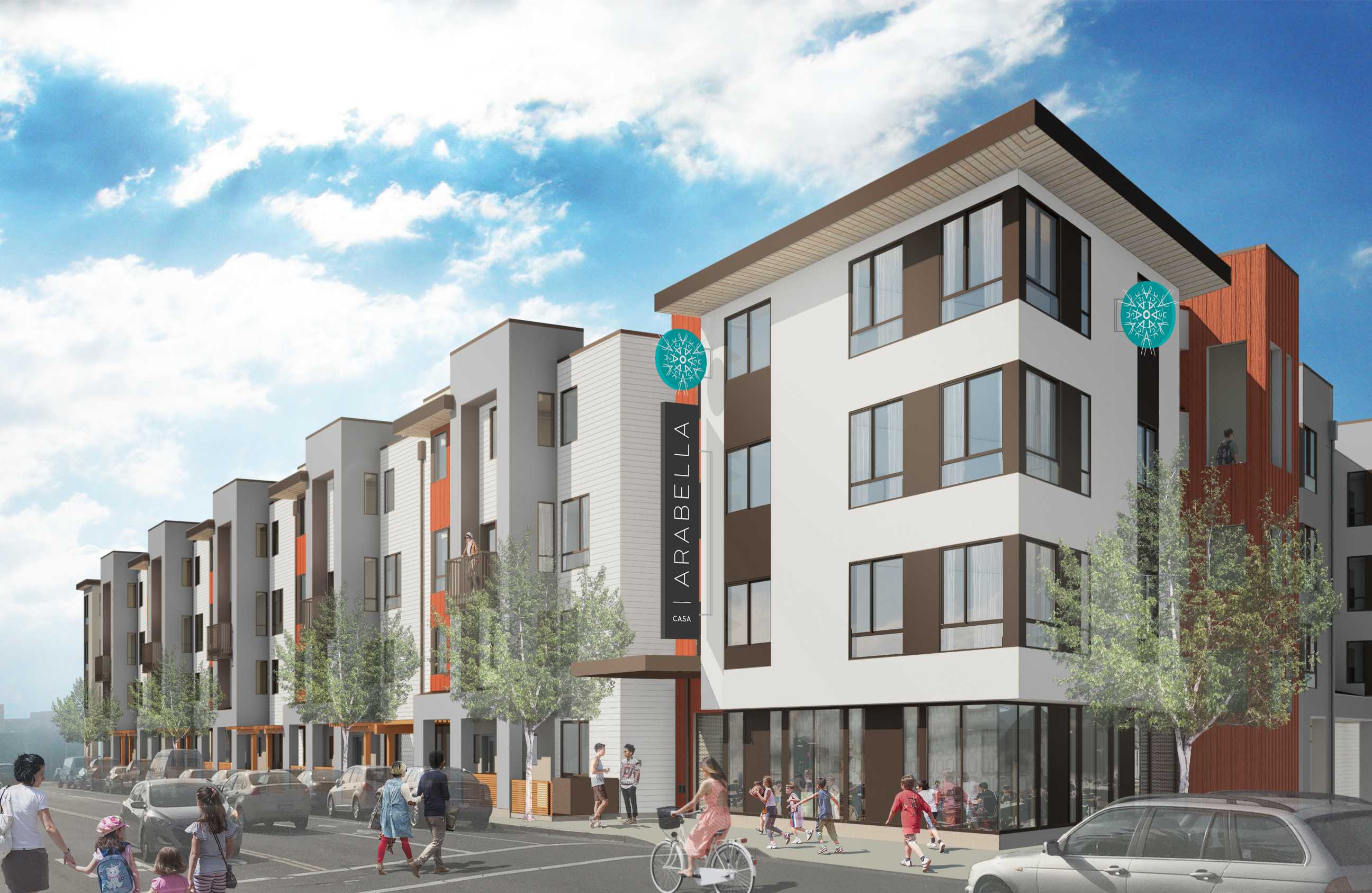
Casa Arabella is the result of two major community organizations working together to increase affordable housing for East Oakland.
Oakland, California – January 23, 2018 – The Unity Council (TUC), an Oakland-based social equity development corporation devoted to improving the quality of life in Fruitvale and like communities through an innovative, neighborhood-focused economic equity approach, working in partnership with East Bay Asian Local Development Corporation (EBALDC), announces that work has begun on the Fruitvale Transit Village Phase II-A project. The $60 million, transit-oriented development project includes a new, 94-unit, multi-family housing development that TUC has named “Casa Arabella.” Taking place on the City-owned BART parking lot, the development will be located in Oakland’s Fruitvale neighborhood, only steps away from the Fruitvale BART station, a major AC Transit hub, and the planned Bus Rapid Transit (BRT) line.
“The combination of affordable housing directly next to public transportation is part of the solution to our cost of living crisis,” Mayor Libby Schaaf said. “Our partners at The Unity Council and EBALDC are working hard to make all sure all Oaklanders have a shot at living in an affordable, equitable, city. Casa Arabella helps maintain and protect what we value most in Oakland – diverse and inclusive neighborhoods where all children, and all families, can prosper.”
TUC and EBALDC closed funding for the Fruitvale Transit Village Phase II-A project in late December 2017. Casa Arabella, named to honor Arabella Martinez, TUC’s founder, and former CEO, will provide permanent affordable housing to close to 400 residents in the Bay Area whose household income is at or below 20-60% of the area median income. At least 21% of the units will be reserved for formerly homeless U.S. military veterans. Designed by Pyatok Architects, and to be constructed by Branagh Inc., both Oakland-based businesses, the new complex will draw on the influences of the Fruitvale neighborhood’s vibrancy and style, blending comfortable family townhomes with one-, two-, and three-bedroom flats. Several communal courtyards are planned for gathering and providing play space for families with children.
“Central to the mission of The Unity Council is providing equitable economic development that not only provides concrete services to families in need but also elevates and enhances the quality of life and vibrancy of the entire neighborhood. Casa Arabella is a manifestation of that mission,” said Chris Iglesias, CEO of The Unity Council. “Our project partner, the East Bay Asian Local Development Corporation, shares our commitment, bringing decades of affordable housing development experience to the Fruitvale Transit Village Phase II-A project.”
In addition to managing the apartments, EBALDC and TUC will provide onsite support services to residents, including a full-time resident service and workforce coordinator, who will connect residents with economic empowerment services, as well as a full-time veteran services specialist.
Initial work on the project began this month with the rerouting of PG&E utility lines. A groundbreaking ceremony for the official launch of the Casa Arabella development will be held on March 2nd, 2018.
Funding for the Fruitvale Transit Village Phase II-A development comes from City of Oakland, Alameda County, the State of California, the Oakland Housing Authority, Federal Home Loan Bank of San Francisco, California Municipal Finance Authority, MUFG Union Bank, Citi, and U.S. Bank.
ABOUT THE FRUITVALE TRANSIT VILLAGE PROJECTS: TUC received international attention for the Fruitvale Transit Village Phase I development, which opened in September 2003 and is considered a national model for inner-city redevelopment. The $100 million transit-oriented development integrated mixed-income housing, retail space, and community space around a mass transit hub. Creating 400 permanent jobs, the development encompasses over 60,000 square feet of health and medical services and provides over 30 mixed-income one- and two-bedroom apartments.
Phase II-A is the development of Casa Arabella, which is scheduled for completion in 2019. TUC has already begun the proposal submission process to State, City and County funding sources for the future Fruitvale Transit Village Phase II-B for which BRIDGE Housing is the development partner. This project will develop 181 mixed-income housing units and an Urgent Care Facility for La Clínica de la Raza along the adjacent parking lot to Fruitvale Transit Village Phase II-A. The projected cost for II-B is estimated at $87 million.
ABOUT THE UNITY COUNCIL: The Unity Council envisions a joyful, united, and engaged community where people have the power to shape their lives. Founded in 1964, its Mission is to promote social equity and improve quality of life by building vibrant communities where everyone can work, learn and thrive. The Unity Council’s landmark TOD at the Fruitvale Village has revitalized the Fruitvale commercial corridor by incorporating community benefit real estate, small business support, and mixed-income housing. The Unity Council manages over a dozen programs in education, economic empowerment, and social services.
ABOUT THE EAST BAY ASIAN LOCAL DEVELOPMENT CORPORATION: The East Bay Asian Local Development Corporation (EBALDC) is a non-profit community development organization with over 40 years of experience in building healthy, vibrant, and safe neighborhoods in Oakland and the East Bay. We address the specific needs of individual neighborhoods by connecting the essential elements of health and wellbeing through our Healthy Neighborhoods Approach. EBALDC is known for developing and managing diverse, mixed-income complexes and communities, while providing vital social and financial services, to help give long-time, low-income residents the ability to stay in their neighborhoods. We know Oakland well and invest deeply in our neighborhoods. We recognize and build upon the assets unique to each community to inform and establish thoughtful partnerships that will address the social factors impacting a neighborhood’s health and wellbeing. This comprehensive perspective helps families and individuals begin a path toward healthy, stable, and fulfilling lives in a holistic, sustainable way.
